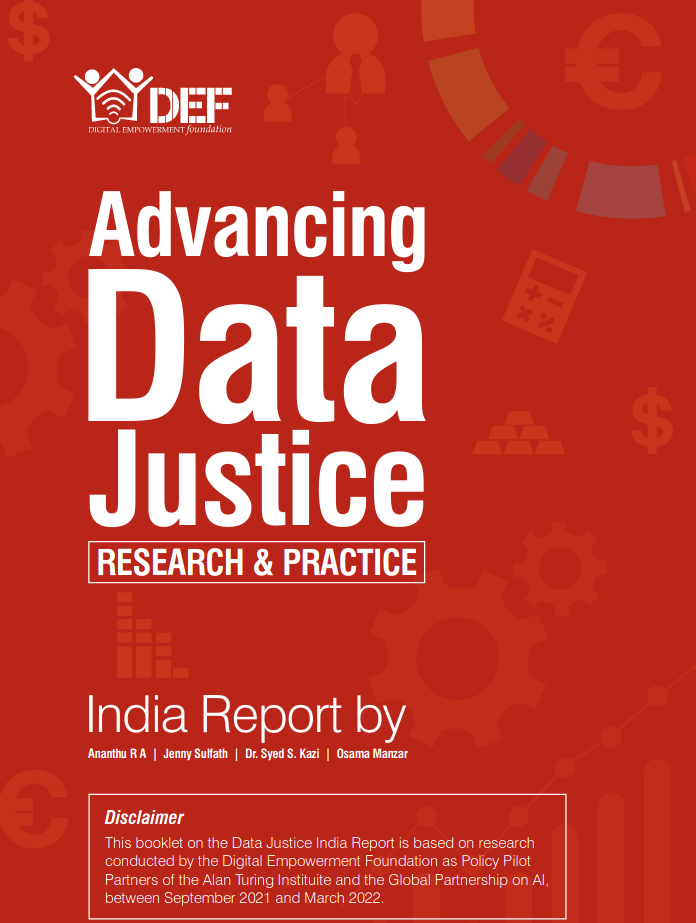This is one of the narratives of the communities impacted from data injustice which are published in the research report on data justice by Digital Empowerment Foundation

The injustices that algorithms of platform and gig-economy apps cause has been documented previously. In India, the workers in the gig-economy are counted as “clients,” depriving them of many protections labour laws provide. In such an unorganised sector, Shaik Salauddin of the Indian Federation Of App Based Transport Workers (IFAT) is one of the leaders organising and unionising people working in ride-hailing and delivery apps. We speak to him in detail about the algorithms that cause injustices.
In December 2019, the Indian Parliament passed the controversial Citizenship Amendment Bill, along with the government’s commitment to enforce a National Register of Citizenship. As Booker Prize winning author and activist Arundahti Roy put it, “Coupled with the Citizenship Amendment Bill, the National Register of Citizenship is India’s version of Germany’s 1935 Nuremberg Laws, by which German citizenship was restricted to only those who had been granted citizenship papers—legacy papers—by the government of the Third Reich. The amendment against Muslims is the first such amendment.” Noting the use of an automated tool to decide the lineage of people in Assam, we spoke to Abdul Kalam Azad , a researcher from Assam, now at Vrije Universiteit Amsterdam, who had looked into detail the issues and exclusions created by the NRC in Assam. Learning of exclusions of Trans People from the same list, (already facing an undemocratic law like the Trans Act), we spoke to two activists from the Trans Community, Sai Bourothu, who had worked with the Queer Incarceration Project and the Automated Decision Research team of The Campaign to Stop Killer Robots, and Karthik Bittu, a professor of Neuroscience at Ashoka University, Delhi and an activist who had worked with the Telangana Hijra, Intersex and Transgender Samiti.
Another exclusion we noted in our primary research was the homeless in any of the data enumerations. We spoke to Jatin Sharma and Gufran, who is part of the Homeless Shelter in Yamuna Ghat on these exclusions and how it leads to the homeless people being denied basic healthcare and life-saving TB treatment.
Four researchers, activists and civil society leaders who had done considerable work on data related exclusions, surveillance, and identification software such as the Aadhar offered their perspectives on the debates, conversations and potential reimaginings of data injustices. Srinivas Kodali, independent activist and researcher; Nikhil Dey, of the Mazdoor Kisan Shakti Sangathan; Apar Gupta, lawyer and director of the Internet Freedom Foundation, and Rakshita Swamy, an NLU professor who also heads the Social Accountability Forum for Action and Research were the people who provided their insights.
Labourers’ Dignity and Linguistic Diversity: Narratives on inclusive Coding
India is one of the most linguistically diverse nations in the world. According to the 2001 census, there are 30 languages in India, it is estimated that there are 1599 dialects within these main languages.25 India also has a complicated history of linguistic politics, where the official languages are the tongues spoken by the dominant communities and several regional dialects are considered inferior. One developer we interacted with was working on an AI tool that helped farmers in markets by converting speech to text, for better communication between different language-speakers. Such a tool would require vast amounts of data to train commercial interest, the project would fall short of including several of these languages, like those spoken in North-East India, a region and communities that have been facing systemic neglect, racism and exclusion. It is also moreover very rare that farmers, or any community for that matter, speak a formal and standardised dialect. Following a top-down approach in developing, and having little consultations with the community, the software is intended to leave issues of representation in the data. Existing power structures are not properly engaged with, and the questions of access and participation are not addressed.
Dignity of labour, as Marx argues, 26 is essential for both the individual worker as well as the idea of labour taken entirely. In our free and conscious activity, the products and the processes of labour, we express our species character. It is not something that is simply related to wages or better conditions of work- both something lacking in most of India’s outsourced ‘call-centre’ economies. As one pyramidal division within the ICT sector, where the workers on the helplines and call-desks unofficially fall into a different tier. It is only recently- in 2017, to be exact- that unionisation has started to slowly pick up.27 One of our conversations was with a developer who worked with AI systems on call centres, and now teaches and researches on AI both technically and in the social sciences. He explained his experiences, saying how “injecting statements that an employee’s work can be automated.” Ironically, the workers would themselves provide the data for the AI to learn their work, leading to displacing themselves, the human workers. He maintains that we need an interdisciplinary approach that works out the sociological aspects of human-technology interactions as any role. Their lack of training in these social aspects reflets in the designs. They rarely have space for given the real impacts the software seems to be making. During his design of software, he recalled how the team built an option where the call centre worker had an option to override an AI suggestion on his gut-feeling and provide an alternative solution. The respect and importance given to the human contribution, he says, had also “contributed to the efficiency improvement and considering the worker as a respectable person.” While these best align with the pillars of knowledge and participation, one key point is the dignity of a worker, something beyond the six-fold categorisation of pillars.








